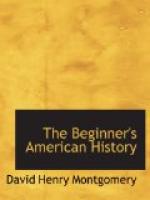There was a high hill on the plantation, which Jefferson called Monticello, or the little mountain. Here he built a fine house. From it he could see the mountains and valleys of the Blue Ridge for an immense distance. No man in America had a more beautiful home, or enjoyed it more, than Thomas Jefferson. Jefferson’s slaves thought that no one could be better than their master. He was always kind to them, and they were ready to do anything for him. Once when he came back from France, where he had been staying for a long time, the negroes went to meet his carriage. They walked several miles down the road; when they caught sight of the carriage, they shouted and sang with delight. They would gladly have taken out the horses and drawn it up the steep hill. When Jefferson reached Monticello and got out, the negroes took him in their arms, and, laughing and crying for joy, they carried him into the house. Perhaps no king ever got such a welcome as that; for that welcome was not bought with money: it came from the heart. Yet Jefferson hoped and prayed that the time would come when every slave in the country might be set free.
[Illustration: JEFFERSON’S HOME AT MONTICELLO.]
[Footnote 3: Monticello (Mon-ti-cel’lo).]
[Footnote 4: See map in paragraph 140.]
185. Thomas Jefferson hears Patrick Henry speak at Richmond.—Jefferson was educated to be a lawyer; he was not a good public speaker, but he liked to hear men who were. Just before the beginning of the Revolutionary War (1775), the people of Virginia sent men to the city of Richmond to hold a meeting in old St. John’s Church. They met to see what should be done about defending those rights which the king of England had refused to grant the Americans.
One of the speakers at that meeting was a famous Virginian named Patrick Henry. When he got up to speak he looked very pale, but his eyes shone like coals of fire. He made a great speech. He said, “We must fight! I repeat it, sir,—we must fight!” The other Virginians agreed with Patrick Henry, and George Washington and Thomas Jefferson, with other noted men who were present at the meeting, began at once to make ready to fight.
[Illustration: “WE MUST FIGHT!”]
186. Thomas Jefferson writes the Declaration of Independence; how it was sent through the country.—Shortly after this the great war began. In a little over a year from the time when the first battle was fought, Congress asked Thomas Jefferson, Benjamin Franklin, and some others to write the Declaration of Independence. Jefferson really wrote almost every word of it. He was called the “Pen of the Revolution”; for he could write quite as well as Patrick Henry could speak.
The Declaration was printed and carried by men mounted on fast horses all over the United States. When men heard it, they rang the church bells and sent up cheer after cheer. General Washington had the Declaration read to all the soldiers in his army, and if powder had not been so scarce, they would have fired off every gun for joy.




